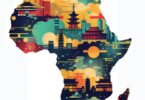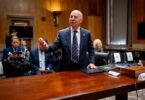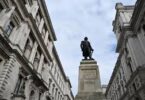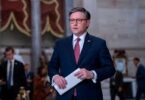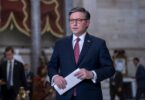Grant Newsham
Experts and models. I’ve got nothing against them. It’s merely the worship of them that bothers me. This coronavirus business with its models and experts being held in awe – and American society on the verge of collapse — reminds me of the 2008 financial collapse. I had a front-row seat. In the run-up, people on Wall Street swooned over “math PhDs with algorithms” – just as a 14th-century man might have spoken of a wizard with a “potion.”
The Wall Street geniuses had figured a way to eliminate risk in financial transactions – and make everybody (mostly themselves) rich as Croesus, or so they thought. Virtually nobody would or could challenge them – and any brave exceptions were howled down. After all, the wizard had algorithms – and PhDs. Even JP Morgan’s Jamie Dimon was berating his guys’ slowness to get into the game, and only lucked out when the collapse came before they could do so.
Carnage ensued: Only half tongue in cheek, one suspects that if any seven gunnery sergeants from the 1st Marine Division had been put in charge of Wall Street’s main firms there would have been no 2008 financial collapse. You see, the masters of the universe would have explained their “structured products,” “credit default swaps” and “collateralized debt obligations.” The gunny’s would have said “WTF?!” and sent them packing. And, remember high school math teachers ordering: “SHOW YOUR WORK!” Can’t today’s experts – citing models as justification for shutting down normal human activity – do the same? After all, they claim our only choice is to die or to submit to home lock-up and destruction of the economy.
But opening their models to scrutiny seems unwelcome – just as algorithms in 2008 were closely guarded and unassailable secrets. Is there a model of what happens when you put 30 to 50 million people out of work? If there is it gets much less attention. Indeed, the current “safer at home,” “shut down the economy” and “flatten the curve” strategies are based on the assumption that stopping the movement of people and developing a proven vaccine will solve coronavirus infections.
And the only consistent rejoinder to people who question the need for all this hugely damaging action is: “Oh, then you want more people to die?” A false dichotomy on steroids. Of course, I’m not saying the virus isn’t a problem. It is. I’m saying that it is probably less of a problem than Imperial College in London with its algorithm – I mean model – just a few weeks ago assured us it was.
Early in March doctors at Imperial College ignited catastrophic predictions of 2.2 million coronavirus deaths in the US, and 500,000 in the UK. The few health researchers who disagreed were initially belittled as not understanding how viruses work or the complications of health modeling. Despite the academic equivalent of name-calling, researchers at Oxford University put up their own models that they said showed much, much lower fatality rates. Initially, the Imperial College researchers said they stood by their higher death rates, but then they dropped the UK estimates. At first, the UK fatalities dropped from 500,000 to “under 20,000,” and then less than a week later to 5,700, or fewer.
One is properly confused. The 500,000 UK figure was supposed to be a certainty. The same percentage drop that the Imperial College’s researchers used to ratchet down their original UK fatality predictions (from 500,000 to fewer than 5,700) would imply a very steep drop in the predicted death rate in the US from the originally predicted 2.2 million to about 25,000 coronavirus deaths. That death toll – bad as it is – is the same as a mid-range death rate for a normal flu season in the US. Show their work!
And there is another troubling aspect to all this: It is serious business to determine whether the harm from the coronavirus is worse than the damage from creating something worse than the 1930s Great Depression. But the lockdown-and-economy-be-damned strategy has been implemented with little if any debate. And the people’s representatives have apparently gone into hiding. In fact, it appears the debate is controlled – and important decisions are made, unchallenged – by people who have government jobs, well-funded academic sinecures or secure pensions.
I suppose that makes sense. After all, what would the lower orders know about such things? They’ve not done the modeling. Taking a few weeks or months off from the job and sitting at home looks a lot different when you’ve got a secure paycheck coming in. You can just telework. Presumably the 3.2 million Americans who applied for unemployment benefits last week didn’t get the message. And how exactly do hotel and restaurant workers, department store clerks, or laid off pilots and flight attendants telework?
Maybe just give everyone a couple of thousand dollars? That doesn’t go very far, but does bring to mind Marie Antoinette’s apocryphal “Let them eat cake.” The Japanese government in fact tried this a couple of times over the last 20 years. It didn’t work. One wonders if anyone in Washington knows that unemployment will kill a person just as dead as the coronavirus. It just takes longer.
The Great Depression permanently scarred my parents, and they passed some of the angst on to me. So I would prioritize the economy. Vietnam veterans might also detect something familiar about the argument for letting the economy crash in order to “save lives.” Sounds a bit like the line, “We had to destroy the village to save it.” Robert McNamara presumably had an algorithm.
Regardless of how one comes down on this, one ought to grasp the importance of not being awed by credentials and models. Even Dr. Anthony Fauci is not the font of all knowledge. Indeed, on January 26, 2020, he said regarding the coronavirus:
“It’s a very, very low risk to the United States.” He added, “But it’s something that we as public health officials need to take very seriously.… It isn’t something the American public needs to worry about or be frightened about.” Really?
All this ought to prompt journalists and political leaders to demand detailed answers as to what the details are behind these models and estimates – and the economic and social effects. Instead, there is a uniform disinclination to ask for or to give out that information.
On the journalists’ part, maybe it is laziness or maybe something more – given media animosity toward the president. As for the medical professionals, maybe it’s fear of being shown to be a lot less omniscient that they are fond of pretending to be.
As for politicians, it’s anybody’s guess. Tough times, for sure. But one sometimes would rather have seven Marine gunnery sergeants on hand rather than any number of health care professionals and politicians with their hair on fire warning us that we either die or go on lockdown until they let us out.


